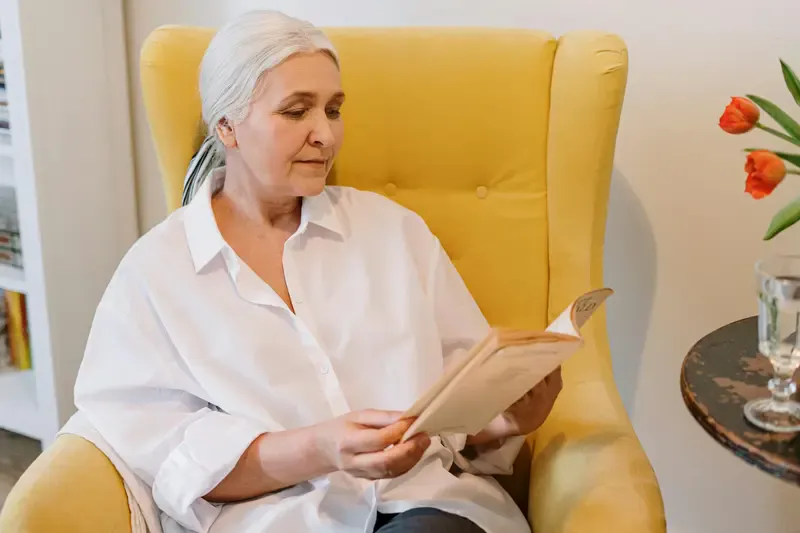Your aging parent just shared a fear about losing independence, and your first instinct is to solve it. But what if what they really need is someone who will simply listen and understand? Learn why genuine listening creates deeper connection than any solution ever could.
When Your Parents Need You to Listen, Not Fix
Your mom mentions she's been having trouble sleeping. Your dad admits he's worried about forgetting names. Your first instinct? Jump straight into solution mode—sleep aids, doctor appointments, memory exercises. It's natural to want to fix things for the people we love. But here's what many adult children don't realize: aging parents often need something far more valuable than solutions. They need to feel heard.
Watching parents age can feel overwhelming for everyone involved. The roles seem to shift, and suddenly you might feel responsible for solving every challenge they face. But research shows that when older adults feel genuinely listened to by their family members, their stress levels drop significantly and they report feeling less isolated. The magic isn't in having all the answers—it's in creating space for them to share their real feelings without judgment.
Why Jumping to Solutions Can Backfire
When your parent shares a concern and you immediately offer advice, something unintended happens. The conversation often stops there. They might say "okay" or "I'll think about it," but the deeper sharing—the real emotions behind their words—gets buried.
Think about it from their perspective. They're navigating complex feelings about independence, identity, and mortality. When someone immediately jumps to fixing mode, it can feel dismissive, as if their emotional experience doesn't matter as much as solving the practical problem.
This doesn't mean solutions are never helpful. But timing matters enormously. When someone feels truly heard first, they become much more open to exploring solutions together later.
The Simple Power of Feeling Understood
Here's what changes when aging parents feel genuinely heard: they start sharing more openly, they feel less alone with their fears, and the relationship between you deepens in ways that benefit everyone. Studies from Stanford's Center on Longevity show that meaningful conversations between generations provide measurable benefits for both older and younger family members.
But you don't need research to know this works. Think about times in your own life when someone really listened to you. Not the kind of listening where they're waiting for their turn to talk or mentally preparing advice. The kind where they're fully present, asking thoughtful questions, and making you feel like your experience matters.
That's the gift you can offer your aging parents, and it doesn't require any special training or expertise—just the willingness to slow down and be present.
How to Create Space for Real Conversations
Creating emotional safety for aging parents starts with how you ask questions. Instead of "How are you feeling?" (which often gets a reflexive "fine"), try questions that invite deeper sharing: "What's been on your mind lately?" or "What's the hardest part of your week?"
When they do share something vulnerable, resist the urge to immediately respond with advice or reassurance. If your parent says "I hate feeling so dependent," try reflecting back what you hear: "It sounds like losing independence is really difficult for you." This simple technique helps them feel understood rather than managed.
Pay attention to your own discomfort too. When parents share fears about aging, illness, or death, it can trigger our own anxiety about losing them. Notice when you want to redirect the conversation away from difficult topics—that's often exactly when they need you to stay present and listen.
Common Conversations and How to Navigate Them
Every aging parent's concerns are unique, but some themes come up repeatedly. When they express fear about health changes or mortality, acknowledge the reality rather than offering false reassurance. "Thinking about health changes sounds scary" validates their experience, while "Don't worry about that" shuts it down.
When parents grieve lost abilities—driving at night, gardening, remembering details—honor that grief. "It sounds like you really miss being able to garden" acknowledges their loss meaningfully. Avoid immediately redirecting to what they can still do, which can feel dismissive of legitimate sadness.
Many elderly parents worry about becoming burdens on their children. When they express these fears, explore their concerns rather than offering blanket reassurances. "What makes you worry about that?" or "Tell me more about that fear" allows you to understand their specific concerns and address them more thoughtfully than automatic responses like "You're not a burden."
Building Ongoing Connection
The most meaningful support happens in regular, low-pressure conversations focused purely on connection. This means calling or visiting specifically to hear about their thoughts, memories, or current experiences without any other agenda—no logistics, no health updates, just connection.
Ask about their perspectives on current events, request advice about challenges you're facing, or invite them to share stories from their past. This positions them as valuable contributors rather than dependents and acknowledges their continued wisdom and relevance.
Remember that effective emotional support maintains your parent's dignity and autonomy. You're not trying to become their therapist or take over their emotional processing. You're being a caring adult who helps them feel less alone with their experiences.
When Professional Help Might Be Needed
While emotional support through listening is incredibly valuable, it's important to recognize when professional help might be appropriate. If your parent expresses persistent hopelessness lasting more than two weeks, talks about not wanting to live, shows dramatic personality changes, or struggles significantly with daily functioning, these may indicate clinical concerns requiring professional evaluation.
Your role remains providing emotional support while encouraging appropriate professional help when needed. You can offer both genuine listening and suggest professional resources—they're not mutually exclusive.
Taking Care of Yourself Too
Supporting aging parents emotionally can be emotionally draining, especially when you're processing your own feelings about their aging. It's not selfish to seek your own support—whether through friends, family, support groups, or professional counseling.
Sometimes talking through your own concerns with someone outside the family can help you be more present and emotionally available for your parents. At LissnUp, we understand that family caregivers often need someone to listen to them too, without judgment or pressure to have everything figured out.
Remember that taking care of your own emotional wellbeing isn't just good for you—it ensures you can continue being a genuine, caring presence for your parents rather than becoming resentful or overwhelmed.





